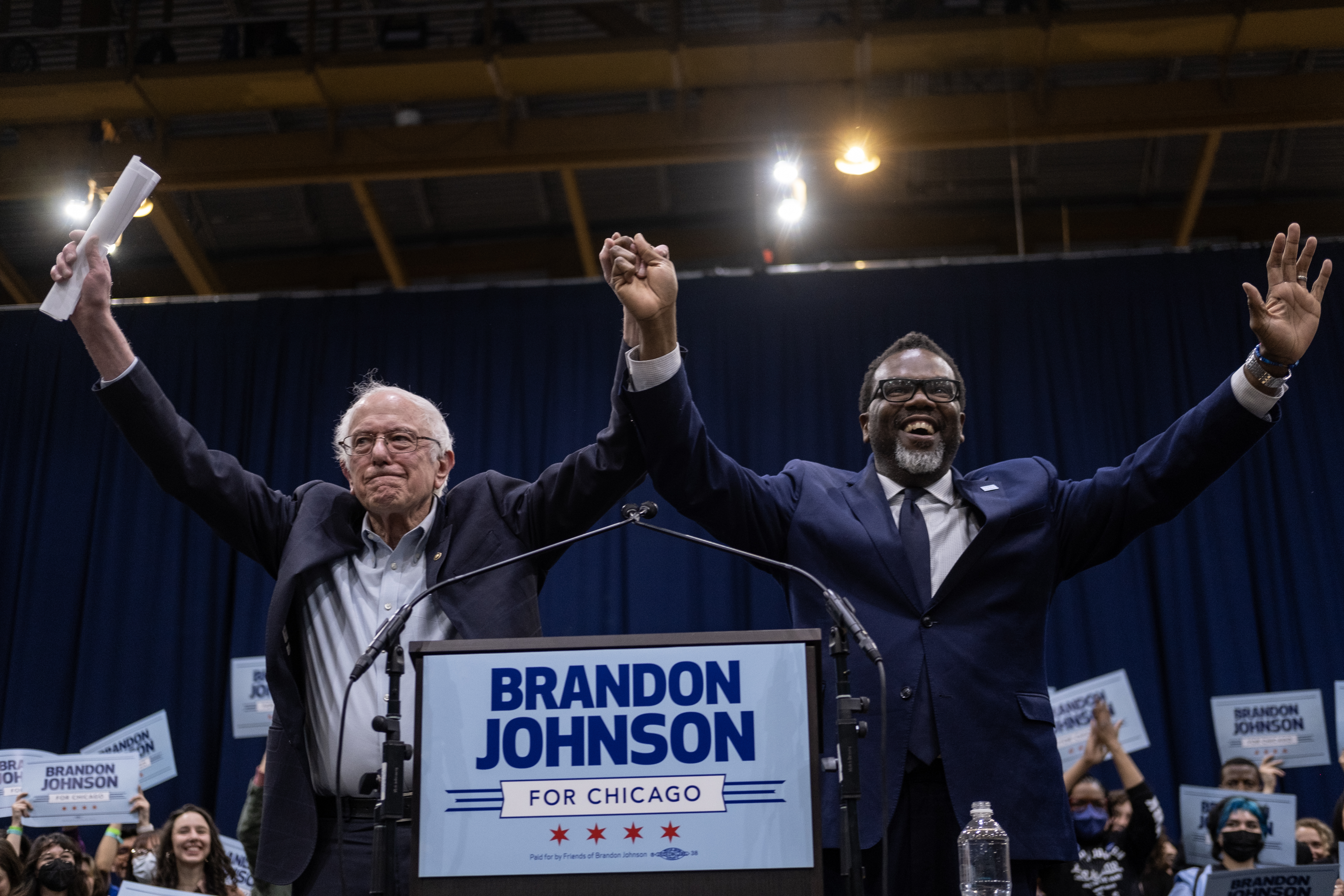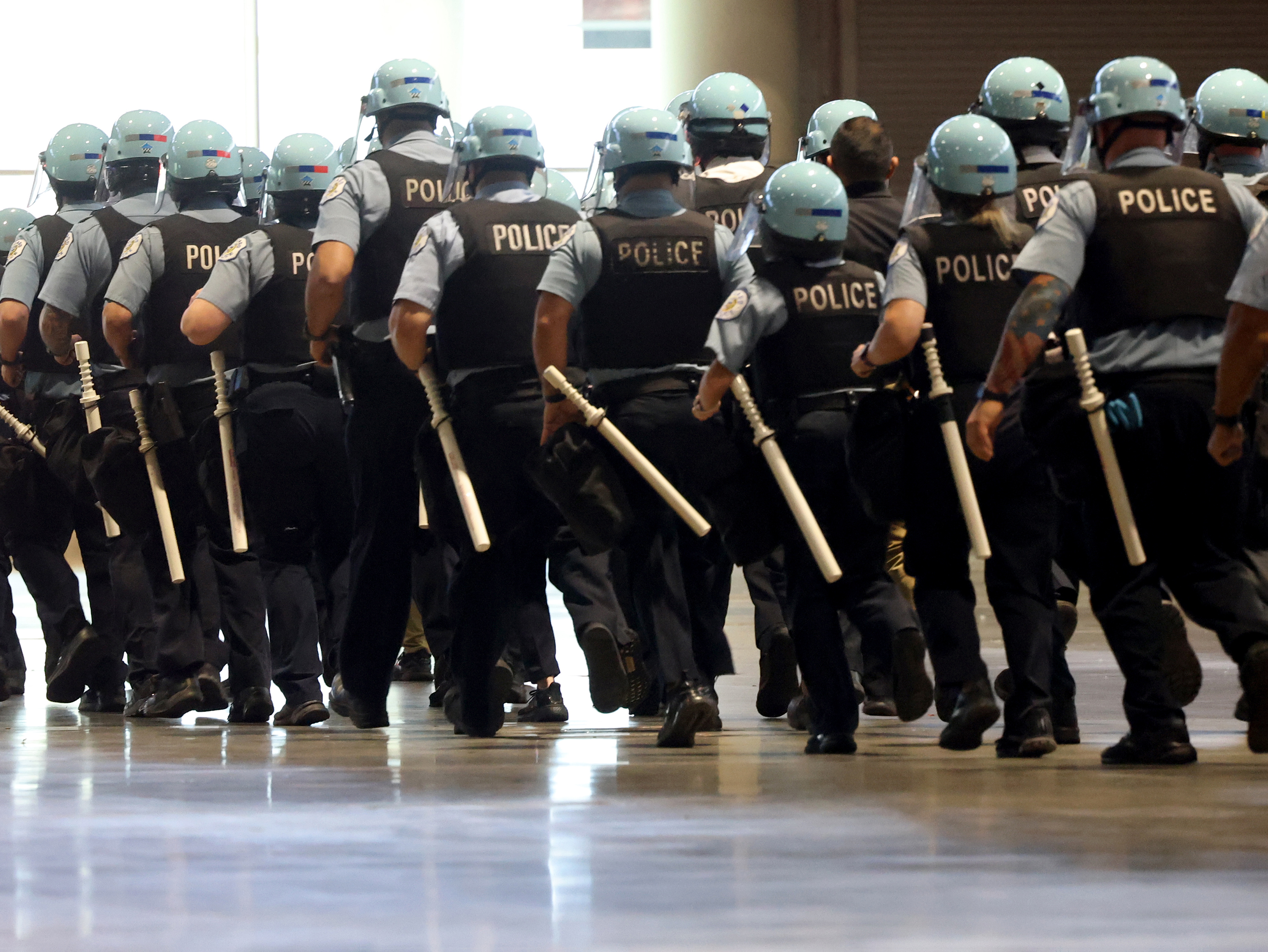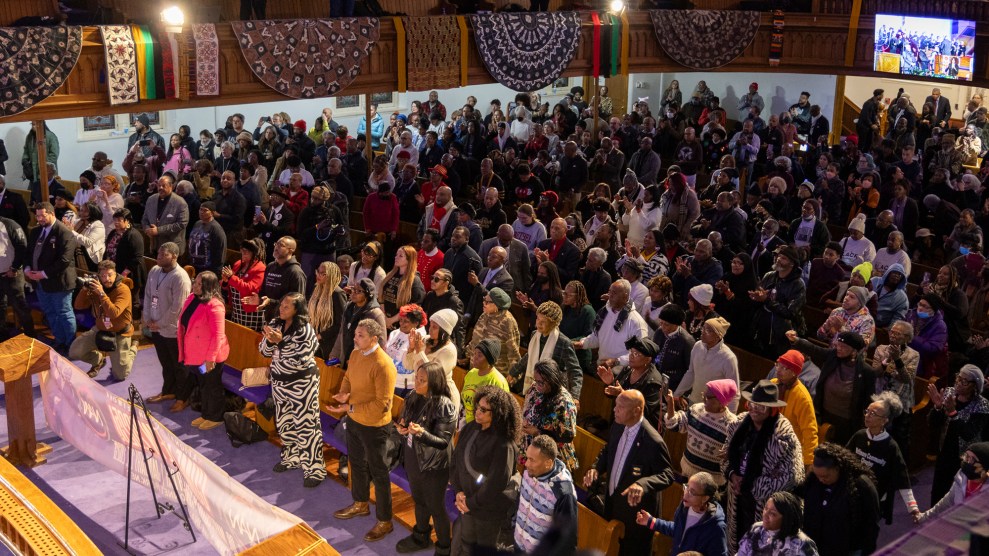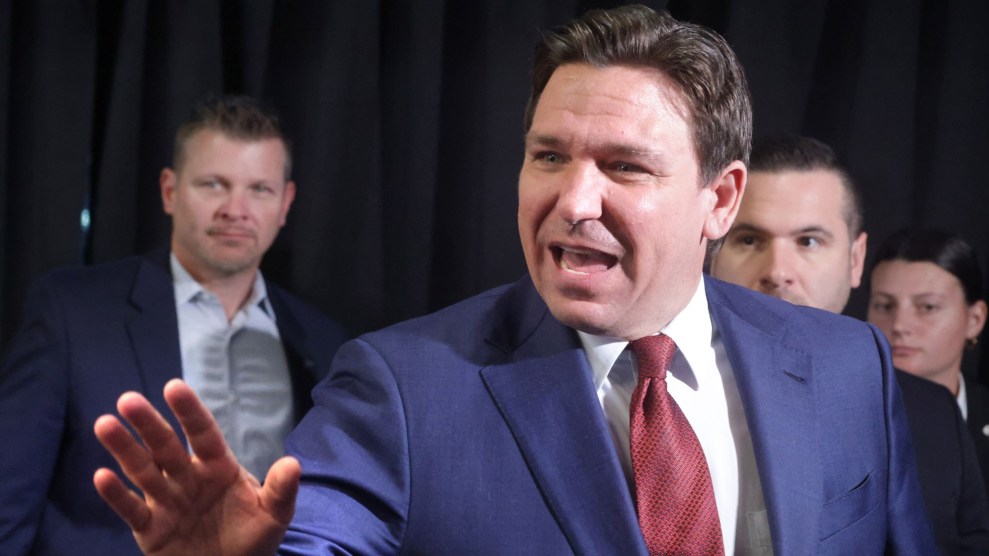Shortly before Chicago’s 2023 mayoral election, Brandon Johnson appeared at a roundtable attended by the progressive activists and modern-day abolitionists powering his shoestring campaign.
Johnson’s political beginnings weren’t that different from those of the activists supporting his candidacy. He started his career as a public school middle school teacher in a neighborhood once dubbed “the most dangerous” in the city. He went on to become a paid organizer with the Chicago Teachers Union, known for its polarizing yet successful teacher strikes in 2012 and 2019. In an effort to re-open a shuttered high school in 2015, Johnson joined a hunger strike and refused to eat solid foods for more than a week. Amid the racial justice protests of 2020, Johnson authored a resolution as a Cook County commissioner to “redirect funds from policing” to public services. (On the controversial concept of defunding the police, Johnson once said on a radio show, “I don’t look at it as a slogan. It’s an actual real political goal.”)
But as the 2023 election neared, the forward-thinking, cancel-rent, defund-the police campaign volunteers that launched Johnson from obscurity began to fear that Johnson’s campaign messaging was “straying from its initial public safety commitments.”
At the roundtable, Johnson’s words fell a little short of revolutionary change. “I’m not going to become mayor and then capitalism will fall,” he joked, according to meeting attendee Asha Ransby-Sporn who wrote about the assembly for In These Times.

The gathering was significant in that it showed Johnson beginning to navigate the interests of his core constituency with those of the broader community that he now governs as Chicago’s mayor. And it is a place he finds himself in again as his city prepares to play host to the Democratic National Convention (DNC) beginning Monday.
His home turf will be teeming with thousands of local Chicago police officers whose Fraternal Order of Police union didn’t support his mayoral candidacy; droves of federal officials whose agencies will supersede his authority; marquee Democratic names who can easily boost political careers or stymie them; and tens of thousands of disillusioned progressive activists, who—like those at the meeting—feel discontent with the status quo, particularly Democrats’ continued support of Israel amidst its ongoing bombardment of Gaza.
A battle between protesters versus police. Constitutional rights versus public safety. Radicals versus realists.
But with his unique perspective as a former organizer and a critic of Israel’s aggressive military tactics who now helps oversee police accountability, Johnson is once more in the position of serving as a bridge between where he and fellow progressives want the party to be and where it is now. Only this time he’s playing that role on a national stage that may determine both the country’s political future, and his own.
“A number of people have had their careers get a springboard at the convention,” says Christopher Cooper, a Western Carolina University political science professor who points to Anthony J. Foxx rising from his post as a mayor hosting the 2012 DNC in Charlotte, North Carolina, to an Obama administration cabinet secretary in 2013.
The extent to which Johnson can manage the imperatives of the protesters to be heard and of law enforcement to ensure security will almost certainly affect whether the DNC serves as an accelerant for the momentum surging through liberal circles right now. Or, as was the case when anti-war protests broke out at the 1968 DNC, escalating stand-offs and violence between the two camps could bring enthusiasm to a screeching halt.
Outsiders describe the tensions as a battle between protesters versus police. Constitutional rights versus public safety. Radicals versus realists. But to Johnson, it’s a balance he wouldn’t be facing at all without his own activism-centered political ascension.
“I certainly understand that without protests,” he tells me during a 45-minute interview, “you and I don’t exist, quite frankly.”
At a contentious January city council meeting marked by passionate speeches and so much heckling that an hour-long recess had to be called, the new mayor cast the tie-breaking vote on a 23-23 deadlock to approve a resolution calling for a permanent ceasefire in Gaza. More than 100 local governments have done so, but Chicago remains the largest by population.
If Johnson wasn’t mired in meetings with local and national lawmakers and law enforcement personnel ahead of the convention, it’s not crazy to envision a previous version of him among the activists painting picket signs to march near the convention site. His support for the city council resolution put him at odds with President Joe Biden and much of the rest of Democratic Party leadership, which has so far continued to supply Israel with military aid despite more than 40,000 reported Palestinian deaths since the terrorist-group Hamas launched its October 7 attacks on Israel, killing 1,200 and capturing more than 240 hostages.
“What’s happening right now is not only egregious, it is genocidal.”
Johnson’s position on the conflict also goes well beyond that of freshly minted Democratic presidential nominee Kamala Harris, who has shown sympathy for Palestinian suffering but has also expressed “unwavering” commitment to Israel and its security. “What’s happening right now is not only egregious, it is genocidal,” Johnson, by contrast, says in our interview. “We have to acknowledge and name it for what it is and have the moral courage to exercise our authority.”
His perspective on First Amendment rights also could not be more distinct from that of Richard J. Daley, who was Chicago’s mayor during the 1968 Democratic convention in Chicago—which is frequently compared to this year’s confab.
At the 1968 convention, Daley had the convention center surrounded with barbed wire. Working 12-hour shifts, police officers clubbed protesters with nightsticks. A few months before, during riots arising from Martin Luther King Jr.’s assassination, Daley instructed the same police force to “shoot to kill arsonists” and “shoot to maim looters.”
In our interview, Johnson reiterates the role he believes protesters play in a just society—a position diametrically opposed to his 1968 predecessor. “My existence is not realized if it were not for protest, and protest is the place where the underdogs come together to win on behalf of the voiceless,” Johnson says.
Yet there are a striking number of similarities between this week’s DNC and the one that took place 56 years ago. In 1968, activists convened at the convention to hold Democrats accountable for their complicity in the Vietnam War; today, protest coalitions are amassing in the city to march against US support of Israel’s bombardment of Gaza. Reminiscent of Biden dropping out and endorsing his vice president to succeed him, incumbent president and early front-runner Lyndon Johnson withdrew from the 1968 race late in the game, enabling his vice president, Hubert Humphrey, to clinch the Democratic nomination. In 2024, a gunman tried to assassinate Republican presidential candidate Donald Trump. Albeit unsuccessful, the recent shooting was redolent of the 1968 assassination on Robert F. Kennedy, whose eponymous son is now running for president this year as a controversial independent.
On the parallels, Johnson says: “History doesn’t repeat itself, but it certainly rhymes,” adding that his “preparation in the context of 1968” has been centered around what Chicago’s present values are.
Those values, Johnson says, are communicated through an expanded non-police crisis response network for mental health emergencies, a fledgling Department of Re-Entry to support formerly incarcerated individuals in avoiding recidivism, a newly appointed chief homelessness officer, and a $150 million outlay to manage the thousands of new migrants who have been bussed to Chicago by conservative governors with hard-line immigration views.
“These investments were going to happen whether the convention was coming or not,” he says. But an added bonus is that the convention will enable the rest of the country “to see what bold progressive leadership looks like.”
Though the DNC will allow Johnson to flaunt progressive politics to a broader audience and engage in dialogue about how the convention should operate logistically, he is far from having unilateral control. Since at least 2004, presidential nominating conventions have been designated as “National Special Security Events” (NSSE), which has shifted authority away from host city governments to fall under the purview of the Department of Homeland Security and Secret Service.
The NSSE designation “makes available the entire toolkit of the federal government to include very sensitive, even classified, resources that the federal government has and can use,” says former FBI assistant director for counterintelligence, Frank Figliuzzi.
In case something goes awry, “there’s a clear chain of command,” Figliuzzi says. “If all hell breaks loose, the feds are in charge.”
Milwaukee Mayor Cavalier Johnson, who exchanged tips with his Chicago counterpart after his city hosted the Republican National Convention in July, maintains that a mayor can play an important role.
“He may not be calling the exact shots and leaving that to the decision makers, who are professionals and experts in the field of law enforcement,” says the Milwaukee leader. “But there’s still considerable involvement from his or her office in executing these sorts of events.”
Given his unique background in organizing and ties to protest groups, Johnson could also serve as an additional line of communication to foster goodwill between protesters and law enforcement.
“I have personally seen mayors weigh in and express their sentiments of, ‘I want people to have a voice. I want more designated protest platforms,’” adds Figliuzzi. “Does the chief of police have to listen to all that? Does the Secret Service really care what the mayor thinks? Yeah, they want to hear the mayor out.”

On Monday and Thursday, a coalition of more than 150 like-minded groups is planning to assemble tens of thousands of people for pro-Palestine marches that begin approximately half a mile from the DNC at Union Park.
The route is shorter than the one the protesters sought, though it will be much closer to the convention site than the city had initially intended. Johnson’s office suggested the 1.4 mile loop as an alternative to the city’s original request that the Coalition to March on the DNC begin their route almost four miles from the convention’s festivities.
“It’s not only a First Amendment issue, but it’s also a chance for the left of the Democrats—which is Brandon Johnson’s constituency—to put pressure on our Democratic leaders.”
Hatem Abudayyeh, a leader of the protest coalition, applauds Johnson for his help in securing their right to be within “sight and sound” of the convention. His help continued on Friday when Johnson personally intervened to rescind strict conditions the city applied to the coalition’s march, including limitations on sound systems and portable restrooms. Johnson’s negotiations made the group’s emergency motion about their First Amendment rights moot.
“He is a friend and an ally to all of the social justice movements in Chicago and beyond,” Abudayyeh says.
Not every protest group agrees Johnson’s advocacy has been sufficient. Bodies Outside of Unjust Laws, an organization fighting for reproductive freedom, LGBTQ+ rights, and an Israel-Palestine ceasefire, expressed that Johnson could have done more to help them secure a permit to march down Michigan Avenue, past the hotels hosting media and delegates, on Sunday before the convention kicks off. They applied for a permit in January, says member Anne Rumberger. It took a lawsuit from the ACLU for the organization to get their march approved in early August.
“It’s not only a First Amendment issue, but it’s also a chance for the left of the Democrats—which is Brandon Johnson’s constituency—to put pressure on our Democratic leaders at a national level,” says Rumberger. “Having some support from him around peacefully demonstrating and peacefully expressing views could have gone a long way if that support could have been part of the permit or appeals process.”
Spokesperson Ed Yohnka of the ACLU’s Illinois chapter says he isn’t convinced city leaders and police are on the same page when it comes to protest response tactics. Yohnka says they have not been assured the Chicago River drawbridges would not be raised to thwart protests, as was the case during the 2020 demonstrations responding to the murder of George Floyd.
“[Johnson’s] background—his history, certainly his instincts—are comforting,” says Yohnka. “But does that trickle down… to line officers who are going to be face to face with protesters?”
The answer to that question is almost certainly imminent. While the Coalition to March on the DNC was able to obtain its permit too, the approved route requires them to use certain side streets that the group believes may cause lengthy bottlenecks.
Whether or not the coalition gets full approval to use the streets they want, Abudayyeh says they will stick to their plans. “We dotted every ‘i’ and crossed every ‘t,’ and if they don’t [approve our plans], we’re still telling people: 12 noon, August 19, Union Park,” he says. “We’ve organized a ton of protests over the years without any permits—we know how to do that.”
Reportedly, a special courtroom has been prepared to process mass arrests. Criminal jury trials have also been re-scheduled for after the DNC, according to News Nation, and criminal judges have been told to free up their week in case their services are needed.
At a July 25 security briefing, federal and local law enforcement leaders as well as city and state officials laid out the preparations they’ve made ahead of the convention. According to officials, there will be 2,500 Chicago police officers, an additional 500 from out of town, plus an array of Secret Service personnel.
When it was his turn to speak, Johnson told the media “Chicago is ready” for its moment in the national political limelight.
We will soon find out whether the mayor is, too.

















